The creation of the Southern Front. Prewar events
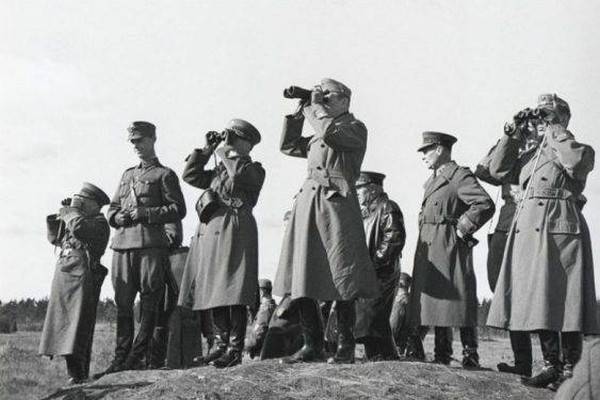
Separation of duties
8 March 1941, the NGO sent a document to the government, on the basis of which the Decision on the division of responsibilities between the Deputy Commissar of Defense was prepared. March 15 issued a corresponding order Commissar.
The 1 Deputy Commissar of Defense Marshal Budyonny was entrusted with the management of quartermaster supply, non-defense construction, planning and distribution of the material assets of NGOs, housing maintenance issues, sanitary and veterinary status of spacecraft. Budyonny was set aside from the issues of combat training, planning, production and development of military equipment, etc. Marshal Budyonny became the rear man ...
How often did the spacecraft management and Marshal Budyonny visit the Stalin office in 1941? Except for the meeting on the evening of June 21, the military (Commissar of Defense and Chief of the General Staff) were in the office of Stalin 33 times, of which 11 times before the release of the above order. SM was present with them six times. Budyonny (55%). By inertia, Marshal Budyonny got to the meeting as early as March 17 and was present among a large number of military personnel at the March meeting of 23. Next time S.M. Budyonny will get to the leader only at the last peace conference with the participation of the military.
The last peace meeting in the office of Comrade. Stalin
Soviet intelligence officer "KHTs" (trade attache of the German embassy in Moscow G. Kegel) 21 June sent two messages. Information for the first message KHTs received, while still at home: “The embassy received a telegram from the Foreign Ministry. With 4 hours of the morning there is a meeting with Tippelskirch. Source convinced that the war will start in the next 48 hours... » Mr. Kegel arrived at work at 12 in the afternoon.
The second message the scout could transmit only to 19: 00: “... The embassy in the morning was instructed to destroy all the secret papers. It is ordered to all employees of the embassy to pack their belongings and hand them over to the embassy until the morning of June 22. Living outside the embassy - move to the embassy. Think that coming night will be a decision. This decision is war... »
After reading the last message, the Chief of the Intelligence Directorate, General Golikov, before the 20-00 orders the special commander to deliver a report urgently Stalin, Molotov and Tymoshenko. The envelopes indicate: "Only to the addressee. Staff members do not open».
After the meeting ended in 20: 15, this package should have been brought into Stalin's office. After reading the message, Stalin was simply obliged to call the senior NKO commander back to himself in order to understand how to proceed. There is no information from the embassy in Berlin during the day ...
If we accept this version, the Commissar of Defense and the Chief of the General Staff did not know about the reason for the call to Stalin. Therefore, the Chief of the General Staff could not take with him a certain draft Directive to be sent to the troops. The phrase about this in the memoirs is fiction, like all previous text about the events of 21 June. This version is confirmed by S.M. Budyonny.
I assume that Marshal Budyonny at the last meeting was called only because Stalin did not understand what position the military took and what was really happening at the border. Stalin was needed military adviserwhich he would trust more than called managers. That is why Marshal Budyonny was summoned to a meeting with Stalin in first time after 23 March 1941 of the year.
CM. Budyonny: “In the study of I.V. Stalin was summoned by Tymoshenko ..., Zhukov ... and I ... Stalin informed us that the Germans, without declaring war, could attack us tomorrow, i.e. 22 June, and therefore what we should and can do today and before dawn 22.06.41
Tymoshenko said that "if the Germans attack, then we will break them on the border, and then on their territory." I.V. Stalin thought and said: “This is not serious,” he turned to me and asked: “What do you think?” I expressed my thoughts ...
Do you know what we are doing at the border now?"I replied that no, I do not know.
“Why do you not know?” I replied that I was in charge of the rear of the army, and the Commissar and the headquarters were in charge of operational issues, weapons, and me before this work do not allow.
“This is stupid, why did you not say earlier?” I replied: “I assumed that this installation was given from above ...”.
It can be said that Marshal Budyonny was summoned to the meeting as commander of the second-line armies. He was appointed to this post 35 minutes ago. But then it turns out that Zhukov was summoned to the meeting as the head of the direction, which included the LUF and LF. He was also assigned to this post 35 minutes ago. To lead these fronts, he had to go south. Additional post G.K. Zhukov could not have been the basis for a call to Stalin due to the absence of the Deputy Commissar Meretskov, who was also entrusted with the general leadership of the Northern Front with on-site visits.

Perhaps, the deputy of Meretskov already left for Leningrad? On the last peaceful day writes army general K.A. Meretskov: “My immediate superior, the people's commissar of defense, summoned me to himself ... The words of the people's commissar unusually sharply and anxiously entered my mind. S.K. Tymoshenko said then:
- Perhaps tomorrow the war will begin! You need to be a representative of the High Command in the Leningrad Military District. You know his troops well and will be able to help the district leadership if necessary. The main thing is not to succumb to provocations.
- What are my powers in case of an armed attack? - I asked.
- Exposure first. To be able to distinguish a real attack from local incidents and prevent them from escalating into a war. But be on alert. In the case of an attack, you know what to do ... ”.
This conversation could only occur after the end of the second meeting in 22-20. On similar words Commissar of Defense "be able to distinguish a real attack from local incidents and prevent them from escalating into a war. But be on alert. In the event of an attack, you know what to do ...”Said the commander of the OdVO, whom Tymoshenko would call 23-00. Around this time, the Chief of Staff Zapovo calls back to the headquarters of the 4 Army and says similar words. He probably retells the instructions of the Commissar of Defense. It turns out that nothing concrete about bringing the troops on alert to the spacecraft leadership before the end of 21 June does not transfer to the border districts ...
The son of General Meretskov, Vladimir Kirillovich, cited evidence of one of the participants of the departure of S.A. Panova on the night of June 22: “It was a late hour. Time before the departure of the train "Red Arrow" remained on the edge. Meretskov fast packed a suitcase, called a car and hurried to the railway station ... In the morning, Moscow was left behind. Why are we going to Leningrad - I do not know. It is impossible to consider a normal business trip, as time was usually given for road training. And now, an emergency exit, as if by anxiety, did not allow it. They did not even leave in their car FD2254, in which the army general around the districts constantly traveled, but in the one that turned out to be closer and could be hooked up to the train more quickly. That was the wagon of the Chief of Military Communications of the spacecraft FD2261 ...»
The train "Red Arrow" went to 23-55. Travel time - 9-45 (according to other data - 10 hours). In no way could the deputy commander arrive at the headquarters of the LVO before the start of the war at dawn on 22 June in order to properly assess the situation ...
Stalin's meeting ended in 22-20. The directive to the encryption department will be submitted in 85 minutes. And there will not be a single call to the command of the border troops indicating the rise of troops until one o'clock in the morning ... They do this only if they are sure that they are right ...
CM. Budyonny: “... I went straight to my job and began to form the front headquarters. Tymoshenko and Zhukov were not given me a chief of staff, and I asked t. Sokolovsky, with whom I worked for three years in the Moscow Military District ... ”. It turns out that the question of organizing the headquarters of second-line armies was not discussed at all at the last meeting. Otherwise, Budyonny would have expressed his wish about the chief for his staff and the issue would have been resolved right in Stalin's office. As the chief of staff, Budyonny will have to take his adjutant general Pokrovsky. Not because of the new appointment caused Marshal Budyonny to Stalin. The meeting was held precisely in connection with an unexpected report on the possible beginning of the war on the morning of June 22, and this was unexpected for Tymoshenko and Zhukov.
New Chief Glavpura
How did the draft Resolution, prepared on the evening of June 21, influence the appointment of L. Mehlis to the post of Chief of the PP PP KA? According to the memoirs of Lieutenant General I.V. Kovalev (from 21.5.41 - Deputy to Mehlis for Railway Transport) The unofficial appointment did not take place on June 21, but earlier: “[[Mehlis] suddenly stopped visiting the People's Commissariat of State Control ... He soon called me. I asked to come to GU PP KA ... I came and found out from Lev Zakharovich that he was again appointed head of Glavpur, but so far this does not need to be spread ... It was somewhere in the middle of June 1941 g ... "
In the middle of June, not only Glavpur, but many other staffs worked in intense mode, preparing for a future war. Troops and the material unit were covertly pulled up to the border. The country was preparing for war in the summer of 1941. It turns out that Mehlis found work in Glavpur in the middle of June. But nevertheless, in the afternoon of 21 June, A. Zaporozhets remained the head of the state command of the PP KA spacecraft. This is evidenced by an order signed by him.
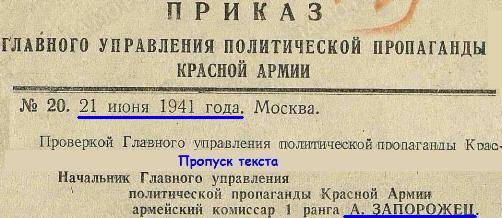
Mehlis arrived at the meeting to Stalin in 65 minutes after it began. This could be due to the fact that Mehlis could not be found after 20-15 for half an hour, which is unlikely. It should be noted that the new chief of Glavpur on the evening of June 21 was not yet officially appointed to this position. Maybe Stalin understood the seriousness of the matter under discussion only at a meeting and ordered that a new chief Glavpur be found later?
Centenary of the death of Lermontov (1814 — 1841) Moscow Theater. Vakhtangov put the drama "Masquerade". On the evening of June 21, there was to be a premiere performance. Expected the arrival of Stalin. The security guards of the country's highest officials from the special department of the NKVD arrived at the theater. Unexpected and incomprehensible events at the border, the unclear position of the German government led to the premiere being held without the presence of the leadership of the USSR. The same officers of the NKVD special section on the morning of June 22 arrived at the Central Telegraph to ensure the security of the facility, which will be someone from the leadership of the country. At that time it was not yet known that instead of Stalin, Molotov would appear. This once again underlines the unexpectedness of the events that took place on the evening of June 21.
What the managers of the spacecraft did not
According to the memoirs of the general L.M. SandalowGeneral of the Army Korobov, commander of the 4 Army, spoke on the late evening of June 21: “I, as commander of the army, have the right to raise one division on alert. I wanted ... to raise 42, but I consulted with Pavlov, but he did not allow ... ” About the same writes and the commander of the 10-th mixed aviation division N.G. Belov. General Korobov was not the initiative commander ...
And how many troops in the western border military districts could alarm the Commissar of Defense with the Chief of the General Staff without Stalin’s sanction? If the army commander can raise one division, then the comrades indicated are no less than ten! And how much did they raise before the end of 21 June? At the border - not one!
Could they not raise the infantry troops, but order to disperse across the field Aviation border districts! After all, the reports at the meeting of the highest command staff repeatedly spoke about attacks on airfields in the event of hostilities! They didn’t. For what reason - we don’t know: either they didn’t believe, or they were afraid ... We don’t know what they were doing from June 19-21.
The People's Commissar of Defense did not write anything, and the Chief of the General Staff wrote a clear lie. Something about their actions is systematized in 17-th part of the cycle.
The Chief of the General Staff speaks at a meeting at the General Artillery Directorate on the evening of June 21 (by 20: 00 he had already left GAU). This was written by Commissar of Ammunition Pn Goremykin: “Questions were raised very sharply by General of the Army G.K. Zhukov. He spoke of the need for substantial revision of the mobilization plan for ammunition, referring to the increase in digital tasks ... " Nobody argues that the question of finalizing the mobilization plan should have been resolved. But 21 June this question did not belong to the most relevant, if the Chief of the General Staff expects a war 22 June!
In addition to the General Staff itself, the Deputy Commissar of Defense and the Chief of the General Staff of the Spacecraft, the Directorate for the supply of fuel for the Spacecraft, the Directorate of Communications for the Spacecraft, and the Main Directorate for the Air Defense of the Space Agency. As a leader who, in addition to the General Staff, supervised the fuel supply service, General Zhukov could take care of 19-21 June, for example, by transferring fuel from the Caucasus to ZOVOVO.
As a manager responsible for communications of a spacecraft, could attend to the issue of deploying communication parts, providing them with property at least from spacecraft warehouses. After all, for some parts and connections in June, the assigned composition was called up for fees. In PribOVO, the battalion of VNOS began to call up the assigned structure on its own initiative after June 20-00.
The Chief of the General Staff could have bothered or troubled the Commissar of Defense with the issue of bringing the air defense units into readiness №2, not №3, as they were actually on June 21. A similar precedent has also already taken place in the same PribOVO! Or to return parts of the air defense system from landfills to connections - after all, this issue does not need to be consulted with Comrade. Stalin! Studying in the camps was carried out according to plans approved by the General Staff itself!
But nothing special was done by the specified 19-21 Jun managers. They didn’t even meet Stalin until seven in the evening. They did not even call and it is strange. Find in Zhukov’s memoirs a word about the call to Stalin before seven in the evening 21 June. They are not.
And why did they do this? Yes, because, in their opinion, 22-23 Jun war should not be! And when was the war supposed to start, in their opinion? Yes, in terms of the concentration of troops of the spacecraft on the border - 1-10 July 1941 of the year. They may say: “Lies! These comrades day and night were preparing for war at dawn on 22 June! ”However, there is indirect evidence to the contrary.
For example, the chief of staff of the Central Asian Military District, General M.I. Kazakov writes: “To my direct question:“ When will the war start with fascist Germany? ”- A.M. Vasilevsky replied: "Well, if it does not start in the next fifteen to twenty days... ». The conversation takes place somewhere on June 18-19. In the General Staff at this time it turns out that it is not yet clear whether there will be a war within 15-20 days. And if it does, it can begin by 3 ... 8 July. The indicated period is close to the deadlines for the end of the concentration of spacecraft troops at the border. But if this is indeed the case, then all actions of the leadership of the spacecraft become absolutely understandable: because the war is expected in July! And at the moment: the main thing is not to give the Germans a reason for an earlier attack!
It is worth noting that General A.M. Vasilevsky, speaking with Kazakov, should have known from the Republic of Ingushetia that the German divisions near our border are about 128 units and many of them are still in places of permanent deployment.
The luck of the Odessa Military District
Many people know about the actions of the chief of staff of the OdVO on the eve of the war of the future Marshal V.M. Zakharov, who took responsibility for the decision to lift the district troops. He did not reverse his decision even after reading the text of Directive No. 1: "Having received the directive of the National Commissioner of Defense, I was very excitedAs the order I gave about the withdrawal of district troops to cover areas on the state border was in conflict with instructions received from Moscow... ». The celebrated marshal writes that the directive on the withdrawal of troops to cover areas was in conflict with the Directive! And why Directive №1 was controversial? Let's take a quick look at the specified document.
"The attack can begin with provocative actions ... The task of our troops is not to succumb to any provocative actions that could cause major complications.". Correctly wrote marshal! In the water part, nothing intelligible is reflected. Maybe there is something more intelligible in the order part?
“I ORDER:
a) during the night on 22 June 1941, secretly occupy firing points of fortified areas on the state border;
b) before dawn on 22 June 1941, disperse all aircraft, including military, across field airfields, carefully disguise it;
c) bring all parts to combat readiness. Troops to keep dispersed and disguised;
d) to bring the air defense to combat readiness without additional lifting the subscription. Prepare all measures to darken cities and objects;
e) do not hold any other events without a special order ... ”. Something incomprehensible is again given in the mandative part. It is difficult to call them even half measures.
Item a) concerns machine gun battalions of URs - only they have firing points. You can still on the personal initiative to bring the artillery divisions of URs into position. You can still pretend to be a blunt commander and withdraw machine gun calculations from rifle units and send them to DZOTs ...
Item b) concerns the air force. Only from the main aerodromes, aircraft in the dark (before dawn) cannot be relocated to field aerodromes. Technical personnel and equipment should be redeployed to field airfields! This is what 21 Jun should have done! As well as raising the personnel of the aviation regiments even in the late evening of June 21. In many parts there were no commanders, pilots, the planes did not have time to disperse, etc.
On item at) ground units to raise the alarm. Keep troops "dispersed and disguised"- it is to withdraw them from the location and disguise themselves in areas of concentration on the alert. But these places are located near the points of permanent deployment! Some of these areas are even in 800 meters from the points of deployment ... To the border, these troops are in the text of the Directive must not output !! This is what the chief of staff of the OdVO, who sent troops to the border on his order, writes!
On item d) from Moscow wrote what they implemented in PIBOVO two days ago.
From item d) it follows that further it is necessary to wait for the development of events at the border.
Individuals who were withdrawing troops to the border by their orders were in great danger, since their actions were contrary to Directive No. XXUMX. Only at about one in the morning, clarifying instructions are received by telephone ...
The chief of staff of the OdVO repeatedly addressed the chief of the General Staff with his initiative. In the memoirs of V.M. Zakharov said about the appeal through the Chief of the General Staff to the People's Commissar of Defense, when he did not agree with the words of GK Zhukov. Too obstinate and enterprising chief of staff was General Zakharov, which he should have once responded ...
Few people know that General Zakharov should have left his post on the eve of the war and served at the disposal of the cadre of NGOs. In his memoirs Mv Zakharov wrote: “... I was in the position of Chief of Staff of the 9 Army until 30 June. On this day, an extract from the order of the People's Commissar of Defense against 19 June about relieving me of my post as chief of staff of the OdVO. I acted at the disposal of NGOs ... "
It turns out that the rise of troops and the dispersal of aviation in the OdVO might not have happened if the extract had arrived in the district before the war. The events are very reminiscent history with the commander of the Air Force KOVO General E.S. Ptukhin, in whose place the commander of the VVO Air Force General Novikov was supposed to go. Novikov knew about his appointment to the position in KOVO before the start of the war. General Ptukhin 22 Jun did not yet know that he was being recalled to the NPO. On the way or in Moscow, he would have been arrested in the case of aviators ...
The commander of the OdVO troops should have known about the replacement of his chief of staff, but he did not say anything to Zakharov ... Maybe he was thinking about the possible arrest of Zakharov and did not want to risk it? Suddenly Zakharov will tell about the revelation during the interrogation. Maybe that's why on the night of June 22 he transferred to General Zakharov all the powers to decide on the expected Directive from Moscow? And if not arrest, then where could General Zakharov be needed?
M.V.Zakharov: "... Arriving in Moscow, I introduced myself to the Chief of the General Staff, General of the Army GK Zhukov. He invited me to work as his deputy in the operational rear ... "
As of 22.6.41, the Chief of the General Staff had two deputies: Army General N.F. Vatutin and corps commissioner S.K. Kozhevnikov (by political part). Should not forget that rear issues until the last peace meeting with Stalin was engaged in First Deputy Commissar of Defense. Therefore, the question of the replacement of the Chief of the General Staff for the rear could arise only after the appointment of Marshal Budyonny as commander of the second-line armies and his departure from Moscow. But this event did not happen on June 19! “Push” somewhere wanted an initiative general V.M. Zakharov. Maybe in the Main Directorate of the rear, if not somewhere worse ...
Since July 1933, V.M. Zakharov was the chief of the operational department of the headquarters of the Belarusian Military District. The chief of staff (from 1932 of the year) in this district until December of 1934 was General Meretskov. From May to September 1938, KA Meretskov and V.M. Zakharov again serve together in the General Staff: at the posts of Deputy Chief of General Staff and Assistant Chief of General Staff, respectively. 23.6.41, Army General K.A. Meretskov was summoned to Moscow and arrested. The leadership of the NPO was to coordinate the development of the NKVD by General Meretskov back in late May - early June. Perhaps, V.M. Zakharov was lucky to have delayed his arrival in Moscow ...
After opening problems in the management of the General Staff in the early days of the war, its reorganization began. After the successes in the first days of the war on the front of the 9 Army, the shares of General Zakharov were to rise. It was supposed to be “on the ear” by Stalin — it was the only sector of the Soviet-German front that could boast of an invasion of enemy territory! Inaccuracies in the work of intelligence were revealed a little later.
After Zakharov arrived in Moscow G.K. Zhukov offers him the post of his deputy. True to the rear ... Two days after talking with G.K. Zhukov General Zakharov appointed to the post of chief of staff of the Main Command of the North-West direction. This position is even higher than that occupied by Deputy Zhukov, Army General Vatutin - Chief of Staff of the North-Western Front. In July, to save this front was already problematic ... In August, 1941, Zakharov was transferred down to the position of deputy head of the Main Logistics Department of the spacecraft rear. Maybe this position was meant for him three days before the war?
Therefore, all proposals emanating from the leadership of the OdVO (it is clear that this will again be the initiative of the chief of staff), in the General Staff tried not to accept.
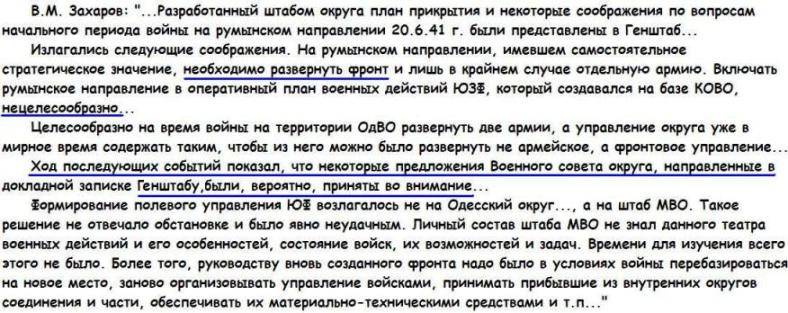
Opinion about the organization of front-line control on the basis of OdVO General Zakharov should have been voiced before sending Notes to the General Staff. However, the chief, who was to carry out the general leadership of the South-Western Front and the Law Department, did not need a very initiative head of the Law Office.
Pre-war documents on the creation of the headquarters of the Southern Front
Consider documents that mention the formation of front-line management in the Moscow Military District or, on the contrary, the formation of such a formation as the head office of the law firm is not supposed. For the first time, the formation of front-line control on the basis of the Moscow Military District was mentioned in the Note, which was signed in October 1940.
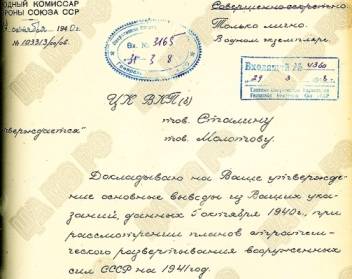

"Provide deployment pattern formation 2-x front-line departments, based on the headquarters of the Moscow and Arkhangelsk Districts and 2's army departments, based on the headquarters of the Western and Kiev special military districts, with the deployment of these offices in the mobilization period...
8. The development of all deployment plans and troop actions, both through the People’s Commissariat of Defense and the People’s Commissariat of the Naval fleet finish by May 1, 1941 ...
People's Commissar of Defense of the USSR Marshal of the Soviet Union S. Tymoshenko.
Chief of General Staff K.A. Army General K. Meretskov ".
Mv Zakharov Wrote: “[At the end of February 1941 of the Year] ... a proposal on the possibility of deploying front-line directorates from the districts' departments, expressed in a report to the Chief of the General Staff G.K. Zhukov, then formed the basis of a note on the cover plan. In the event of war, the General Staff envisaged deploying only one 9 Army on the basis of the OdVO command ... I concluded that the 9 Army would become part of the South-Western Fleet, which, as I knew from my previous work in the General Staff, was deployed from KOVO ... ”. Thus, when developing the “Cover Plans ...” as of March 1941, the deployment of the headquarters of the law firm was not foreseen.
The book Mark Solonin and Elena Prudnikova “The Great Patriotic War: Was there a defeat?” It is said about the preparation of command-staff exercises and front-line operational game in KOVO in the period of 12 – 18 in May of 1941 G.: “... 4.5.41, Deputy Chief of the General Staff, Lieutenant General Vatutin, sends ... telegram No. OP / 1409 to KOVO headquarters:“ Amend the task and plan of the front-line operational game.
1. “Orange” should not be considered neutral, but be counted from the first stage of the game on the “Western” side.
2. The organization and forces of the "orange" take real and strengthen one army corps and tank division of the "western".
3. South front at the last stage do not create, leaving the 16 Army under the SWF ... "
Obviously, the "Orange" - is the armed forces of Romania, "Western" - the troops of Germany, 16-I Army - is the 9-I Army from the OdMO. In the operational scenario of the first stages of the 9-I Army is subordinate to the South-West. Only at the last stage in the scenario of the game in the original version was the reassignment of this army to the SF considered. In the final version of the game, the General Staff made a decision of the LF not to create and leave the 9 Army under the control of the South-West Front. Thus, by the beginning of May, the Operational Directorate of the General Staff does not have a precise understanding that by the beginning of the war and at the stage of border battles with Germany and its allies, the LF headquarters, already concentrated and deployed near the border, is needed.
In May 1941, a draft Strategic Deployment Plan was developed.
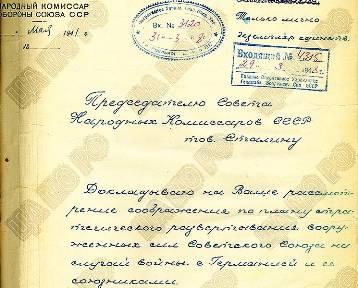
“1. The ground forces of the spacecraft composed of - 198 cd, 61 td, 31 md, 13 cd of the entire 303 division ... distribute as follows: The main forces in the 163 cd, 58 td, 30 md and 7 cd (total 258 division) ... have in the West, of them in the Northern, North-Western, Western and South-Western fronts - 136 sd, 44 td, 23 md, 7 cd (total 210 divisions) ... SWF - eight armies, consisting of 74 rifle, 28 tank, 15 motorized and 5 cavalry divisions, and the total 122 division ... "
The considerations do not consider the participation of the LF headquarters in the deployment of the USSR armed forces on the eve of the start of the war with Germany and its allies. OdVO troops as part of the same army must be subordinated to the South-West Front. There is not a word in the document about the role and place of front-line directorates that could be formed on the basis of the Moscow Military District or the ArVO.
In the directives of the General Staff, which are sent to KOVO and to the OdVO in May 1941 of the year for the development of "Cover Plans" and in the Notes developed in the districts for the defense plan, the troops of KOVO and OdVO are equivalent. In the Notes there is no mention of the fact that the troops of the OdVO must be included in the composition of the LRF and there is no mention of the subordination of the troops of the 9 Army of the LF.
Note on the defense plan for the period of mobilization, concentration and deployment of KOVO troops on 1941 year: “... Neighbors and borders with them. More to the right - ZOVOVO. The district headquarters from the 3 of the mobilization day is Baranavichy ... To the left is OdVO. The headquarters from 3 of the mobilization day is Tiraspol ... ”.
The certificate of the deployment of the USSR Armed Forces in case of war in the West (13.6.41) does not contain information on the formation of front-line control based on the MVO. The document again speaks of the inclusion of OdVO troops into the South-Western Front: "...The structure of the LUSF includes: KOVO - 58 divisions ...; ODVO (without connections, located in Crimea) - 19 divisions ...; PRO - sd - 7; HVO - sd - 7; OrVO - sd - 6 ... ".
From the above it follows that there are no facts about the preparations for the formation of front-line directorates based on the ArVO and the Moscow Military District in the winter and spring of 1941. The decision to deploy the LF headquarters in the General Staff is taken only at the beginning of June 1941. However, the deployment time of the LF headquarters in the southern direction could not be set for June 1941. Probably, the period of concentration of the LF headquarters near the border was planned somewhere in July. By the same date, many deployed troops of the spacecraft had to complete their concentration.
Gen. A.F. Hrenov (Head of the Engineering Forces of the Moscow Military District, from June 22 - Head of the Engineering Forces of the Law Faculty) writes: "... At the beginning of June, the commander ... informed us that we were ordered to prepare for the performance of functions field control frontbut. Which one This question has escaped from many.
“I can’t add anything to what I said,” answered Tyulenev. However, when he began to give orders regarding the nature and content of the training, it was not difficult to guess that in the event of war we are in the south... »
The site "Memory of the People" presents a map of the position of the troops of the LUAF and LF, begun by 20.6.41 Law Firm. Not everything is clear with this map. If it is prepared at KOVO headquarters, then everything is clear: the map shows the location of the associations and formations of this district. But why is it necessary to deploy all the connections in the territory of KOVO to the headquarters of the Law Firm? With a fairly detailed description of the artillery pieces of the KOVO troops that are located on the artillery range?
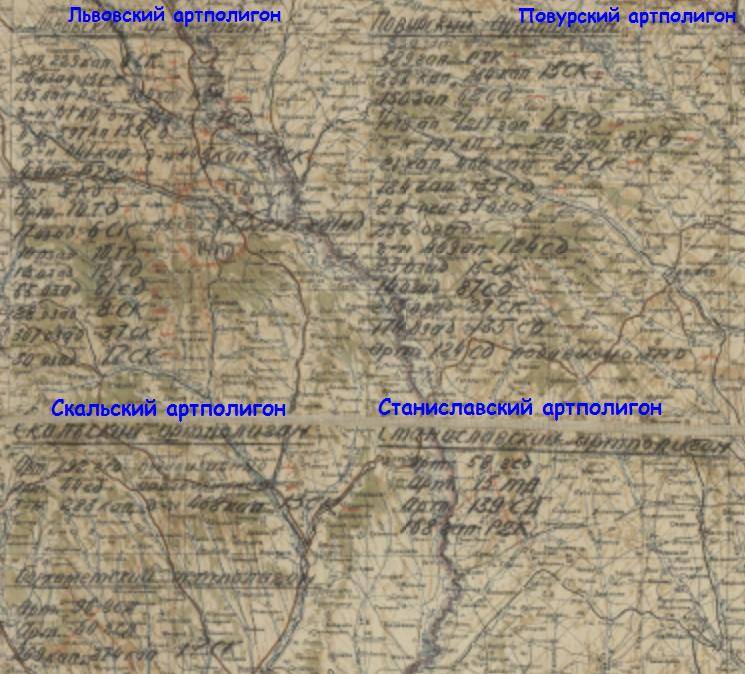
In the enumeration, there are no artillery units from the OdVO troops and all the landfills are located in the territory of KOVO. Perhaps, while preparing the description for the map, the staff of the archive was embarrassed by the fact that the enumeration of the parts at the landfills was made in the OdVO territory? I would suggest that the map was developed at the headquarters of the South-Western Front. If the map were prepared for the headquarters of the Law Faculty, then the situation on the placement of OdVO troops with indication of the KOVO units along the line of demarcation would have been applied to it. This map cannot indicate that the headquarters of the LF with 20 June began preparing for war.
In the Fund A.N. Yakovleva There is an interesting document: Supervisory plan for the collection of senior officers, games, field trips and exercises in districts in 1941, approved by 4.4.41 by the Chief of the Operational Directorate of the General Staff of the Spacecraft, General Malandin. The document contains events with a January-March date of 1941. Therefore, it can be assumed that such a document was developed somewhere at the end of 1940 of the year, and 4 of April was clarified.
From the fragment of the document presented below it is clear that in the ArVO, in addition to army operations, they also developed a front-line operation. Perhaps, in the ArVO, work was done on preparing for the deployment of front-line control during mobilization. It is not clear only: in what direction was this administration planned to participate in hostilities.
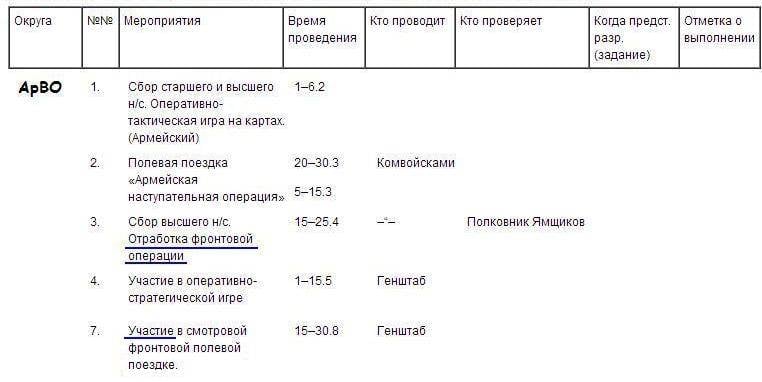
The document refers to the participation in the field front field trip. Participation, or in other words, the presence as observers of the work of the frontline control of the border military district. There are such mentions in events related to other districts that do not have front-line directorates. In these districts there is only army control. For example, the North Caucasus and Volga military districts participate in exercises conducted by the General Staff: “...participation in the front field trip ZakVO 10-20.5, ... participation in the observation trip of KOVO June ...».
In the part concerning the Moscow Military District, there is not a single event related to the conduct of independent exercises at the front-line level. It is a question only of participation in such work in ZOVOVO. All activities in the Moscow Military District are associated only with military level exercises.
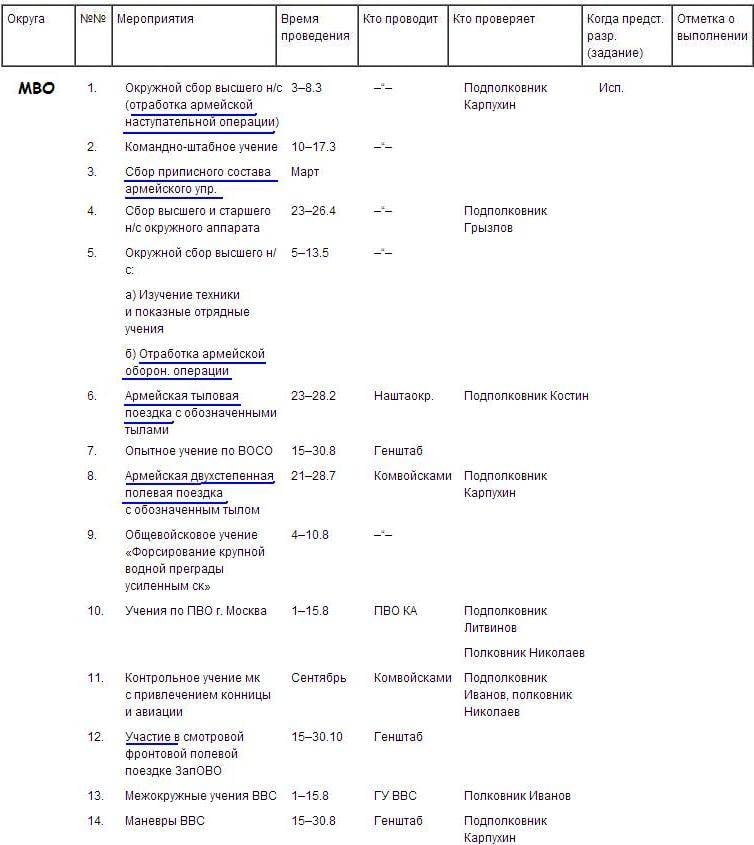
User Strannik1985 correctly indicated that the commander training of the commander of the Moscow Military District, I.V. Tyuleneva ordered him to conduct an army defensive operation (100 km along the front, 100-120 km in depth) on the prepared lines.
If at the end of 1940 of the year it is proposed to form front-line controls in the ArVO and the MVO, and front-line exercises in the 1941 are planned only in the ArVO, then, in April, the 1941 of the year is not supposed to form a front-line control based on the MBO. In part, this is confirmed by encryption from 4.5.41 G .: "Southern Front ... do not create».
In the negotiations outside of 41, two sheets came up that did not correspond in meaning to the previous text. Telegraph negotiations without indicating membership in military units, in which he accidentally drew attention to the words about the army trip.

Assuming that "Vinogradov"- this is Major General V.I. Vinogradov, commander of the 7-th mechanized corps from the composition of the troops of the Moscow Military District, then "Bakunin"- this is Major General F.A. Bakunin, commander of the 61 Infantry Corps (Tula, Moscow Military District). Lieutenant Colonel Petukhov - this is the commander of the operational department of the headquarters of the Moscow Military District; Lieutenant Colonel Klimenko - Commander of the Operational Directorate of the General Staff.

All of these persons could be together only before the start of the war. The mention of holidays - this may be the 1 holiday of May (non-working days of 1 and 2 of May 1941). If you accept this version, then in April 1941 of the year at the headquarters of the Moscow Military District on June 23 an army field training trip is planned. The teachings of the 7 Mechanized Corps were assigned to the same number. 61 st is attracted to playing on the map at this time. It is not clear only: were these events planned separately for each association or were they related to each other?
At 23 June, the exercises were planned not only for the above-mentioned associations of land forces of the Moscow Military District, but also for the 1 Corps of the Air Defense Forces (from the Moscow Air Defense Zone, which was under the command of the Moscow Military District). YES. Zhuravlev (commander of the 1 Air Defense Corps) wrote: “... A few days spent in the camps, flew by unnoticed. Saturday came, and I hurried to Moscow: on Monday was assigned staff exercises of the Air Defense Forces. To him should prepare ...
[With a family] We decided to go to the Agricultural Exhibition in the second half of the day [21 June], and before that I had to go to the headquarters and get acquainted with the plan of the upcoming exercise in detail ... I also thought again and again about possible solutions that would have to be made during the exercise. True, the teaching was ahead of staff ... "
What happened in the parts of the 7 Mechanism Corps that could be involved in the June 23 exercises? The chief of artillery mechanized corps IN AND. Kazakov writes: "[War] I was caught in Moscow ... Parts and formations of the corps were quartered in the Moscow region ... From 13 to June 20 1941, the headquarters of the corps according to the previously developed plan conducted reconnaissance near Kaluga and Tula ...
In the evening of June 20 we received orders to return to Moscow, and in the morning of June 21 was followed by a new order that alerted us. The corps commander was ordered urgently display parts from the camps, and artillery cease training live firing at the Alabino training ground and return to the points of their permanent deployment.
In addition, the corps commander received orders to allocate a motorcycle company, providing it with ammunition, for staffing one of the fronts. Orders were given hastily, in everything nervousness was felt ... The evening was Saturday. Most officers, giving the necessary orders to the junior commanders, went home or left the city, intending to spend a day off in the lap of nature. That the war began, they only learned at noon 22 Jun from the government's radio message ... "
In the memoirs, the text about the urgent withdrawal of troops from the 21 camps in June is puzzling, since on that day most of the commanders go home and do not come back until June noon 22. The combat logs of the units of the 7 Mechanism Corps also do not confirm the fact of the urgent withdrawal of troops from the camps and the cessation of firing.
RC 1-th Moscow Red Banner MSD: "22.6.41 16.00. The order of the division commander to concentrate the division in Moscow. In 21.00 22.6.41. parts of the division made separate columns on the highway Moscow-Minsk, Moscow-Kiev... ".
RCB 14-th TD: “22.6.41. after the speech of the People’s Commissar for Foreign Affairs, comrade Molotova and the received telegram on mobilization, the division commander, Colonel Vasilyev, gave the order to concentrate parts of the division in the district of winter apartments (Naro-Fominsk). With 16.00, units began to move from the camps to winter apartments in the districts according to the mobilization plan ... ".
RCB 28-th TP (14-I TD): "22.6 Regiment being in camps Barkhatovo ... got the task: Go from camp to winter apartments in the area of concentration of forest 800 m north of the military camp, where to start mobilization ...".
RCB 14 gap (14-I TD): "The 22.6.41 regiment in full force in Alabino at the training ground in readiness for combat shooting. 23.6. in the 11.00 regiment focused on the winter apartments of the mountains. Naro-Fominsk, where he began to mobilize according to the plan ... ".
Management 7-th uk to the beginning of the war is deployed in the city of Moscow. 1-I MSD, 14-I and 18-I TD with 5.5.41, were in camps for summer study with the admission to the fees of the assigned composition.
Newspaper "A red star" (12.11.2005 g.): “20.6.41 r. 1-I Moscow division held a regular tactical exercise in the Alabinsky camps. Summing up its results was scheduled for Tuesday. But on Monday evening, the regiments had to hastily return to the capital: the war began ... ".
Commander 1-th ISM General J. Kreizer: “... Sunday 22 June began, as usual. Competitions flared up on the sports grounds, amateur art groups gathered in the clubs of the regiments ... Time approached twelve. And suddenly from the loudspeaker came the alarming words: War! This word is carried, as the alarm ... ".
Conducting reconnaissance from 13 to 20 in June by 7 headquarters in the region of Kaluga and Tula, an urgent return to the location of 20 in June could be associated with drills (involving an 1080 military unit). Conducting tactical day exercises (before conducting a higher level exercise) in the corps corresponds to the usual practice in the armed forces in the postwar period. It should be stated that failed find any information about the possible preparation of 7-th uk exercises on 23.6.41.
To be continued ...
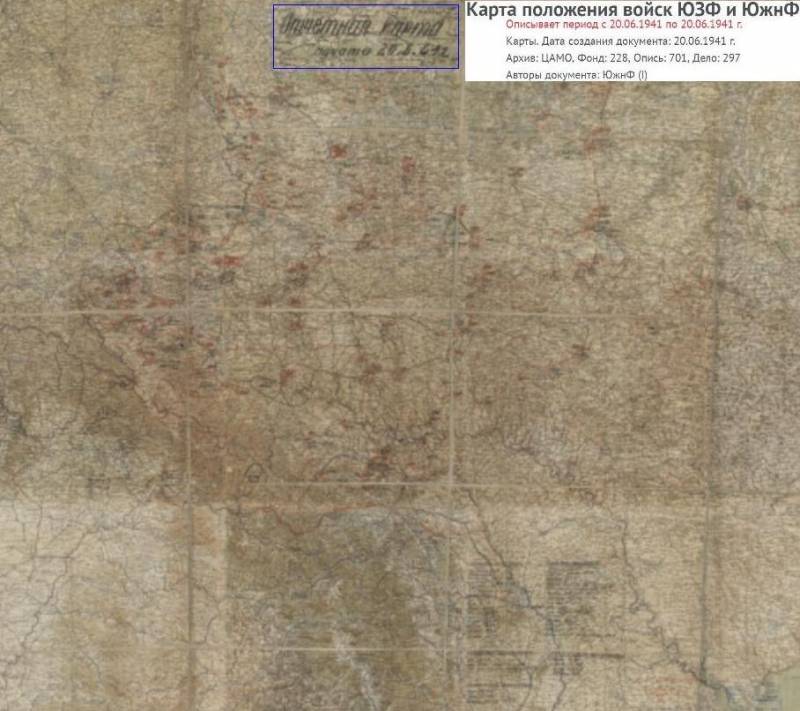

Information